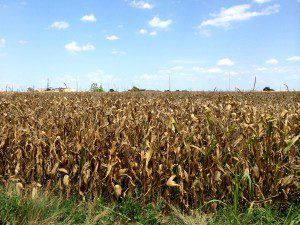In the 1965 film Shenandoah, Jimmy Stewart portrayed Charlie Anderson, a Virginia farmer who tried to keep his farm and his family out of the Civil War. Early in the film, Charlie sat down at the table with his family and said grace before dinner.
Lord, we cleared this land, we plowed it, sowed it, and harvested. We cooked the harvest. It wouldn’t be here, we wouldn’t be eatin’ it if we hadn’t done it all ourselves. We worked dog-bone hard for every crumb and morsel, but we thank you just the same anyway, Lord, for this food we’re about to eat. Amen.
Although both the fictional story and the film itself took place in times that were largely Christian, there is something in this humorous prayer that is very old: older than Christianity and older than the religions that preceded it.
The Earth does not give up her bounty without effort. The Book of Genesis says “cursed is the ground for thy sake” and “in the sweat of thy face shalt thou eat bread.” This was written by and for an agricultural people (one of these days I’m going to write about my Nature-centered interpretation of the Eden myth…). But even for those who live in a tropical jungle, if you wait around on Nature to bring you food you’ll die of starvation. Hunting and gathering requires far less work than agriculture, but it still takes 15 to 20 hours a week.
Charlie Anderson was simply stating facts in his litany of labors. If he and his family hadn’t done all the work, they wouldn’t have the food. So why was he thanking his God? Fear? Mindless habit?
The work of the farmers was necessary but it wasn’t enough. They cleared the land but they didn’t make the soil fertile. They sowed the seed but they didn’t make the seed. They didn’t make the sunshine that fed the plants or the rain that watered them. They may have shooed the birds off but they didn’t keep the hail and damaging winds at bay. Their very lives depended on things they could not control.
Where did the soil, seed, and sun come from? What brought the rain but not the flood? Who brought the breeze but not the storm? There are many possible answers and a harvest feast is not the time for ontological debates.
But two things are certain: they didn’t come from us and they didn’t have to come at all, as the never-ending stories of famine and hunger remind us. They are gifts, and the first response to a gift is to say “thank you.”
 Most of us like to think we’re independent and self-sufficient. But in reality, we simply manage to earn, inherit, or otherwise obtain enough money to exchange for the things we need. Walk through a Southern grocery story when snow is predicted and you’ll realize our “independence” is mostly smoke and mirrors.
Most of us like to think we’re independent and self-sufficient. But in reality, we simply manage to earn, inherit, or otherwise obtain enough money to exchange for the things we need. Walk through a Southern grocery story when snow is predicted and you’ll realize our “independence” is mostly smoke and mirrors.
Walk through the aftermath of a tornado, or a hurricane, or a wildfire and you’ll realize just how impossible the idea of independence really is.
We are as dependent on systems of agriculture, industry, transportation and finance as Charlie Anderson’s family was on the sun and the rain. Those systems are often troublesome and they frequently cause as many problems as they solve, but embedded in them are people who do the very real and very necessary work of growing the grain, baking the bread, and bringing it to us. Whatever we think of the systems in which they work, these people deserve our thanks.
And behind these people are the very same sun and rain, the same soil and wind, and the same fair fortune that supported our ancestors of 150 years ago, that supported the first farmers of the ancient Near East, and that supported our hunting and gathering ancestors for hundreds of thousands of years. They lived because of gifts they did not earn from powers they could not command, and so do we.
The first response to a gift is to say “thank you.”
A key Pagan virtue is reciprocity – a gift calls for a gift. We have been blessed, so we make offerings and pour libations. We sing the praises of our Gods and ancestors, and of our Great Mother the Earth. We give our time and treasure to share with others.
As we approach this wonderful holiday of Thanksgiving, may we remember that the first response to a gift is to say “thank you.”
And perhaps, after we give thanks, we can ask ourselves if these gifts we did not earn and the benefits of these systems that have been created to manipulate the bounty of Nature are distributed honestly and fairly. Gratitude is an essential element of spirituality, but gratitude alone is not enough.
Happy Thanksgiving!















